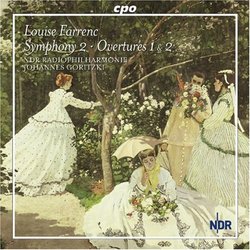| All Artists: Louise Farrenc, Johannes Goritzki, NDR Orchestra, NDR Philharmonic Orchestra (Hannover) Title: Louise Farrenc: Symphony No. 2; Overtures Nos. 1 & 2 Members Wishing: 0 Total Copies: 0 Label: Cpo Records Release Date: 8/17/2004 Genre: Classical Style: Symphonies Number of Discs: 1 SwapaCD Credits: 1 UPC: 761203982028 |
Search - Louise Farrenc, Johannes Goritzki, NDR Orchestra :: Louise Farrenc: Symphony No. 2; Overtures Nos. 1 & 2
 | Louise Farrenc, Johannes Goritzki, NDR Orchestra Louise Farrenc: Symphony No. 2; Overtures Nos. 1 & 2 Genre: Classical |
Larger Image |
CD Details |
CD ReviewsMendelssohnian Music with Hair on Its Chest J Scott Morrison | Middlebury VT, USA | 08/31/2004 (5 out of 5 stars) "Alone among Frenchwomen of her era, Louise Farrenc (née Dupont) (1804-1875) achieved real fame as a composer during her lifetime. She was also a brilliant pianist and was the only woman teacher of any instrument at the Paris Conservatoire in the whole of the 19th century. She had come to this rare acclaim as the result of a liberal upbringing amongst a family of noted painters and sculptors living in an enclave of similarly artistic and intellectual families at the Sorbonne. She studied with Reicha from her teens, but her lessons had to be private because women were not allowed to study as regular pupils at the Conservatoire. She wrote three symphonies; Nos. 1 & 3 are contained on an earlier issue from cpo featuring the same artists, the NDR Radiophilharmonie (Hannover) conducted by Johannes Goritzki, also available (and favorably reviewed) here at Amazon. This CD contains the middle symphony and two much earlier overtures, simply called 'No. 1' and 'No. 2.'
This is very strong music, not only in its craft but in its overall impact. Although the procedures are basically the same as those of her contemporary Mendelssohn, with seamless counterpoint, dramatic effects, harmonic invention, charming melodies and crystalline orchestration, the effect is, dare I say it, more masculine than that of Mendelssohn's similar works. The Symphony and both Overtures begin with fortissimo unison chords that lead quickly to softer songlike first themes that are then given extensive contrapuntal treatment. An overall impression is one of deeply held feelings under stringent control and expressed with a certain monumentality; one thinks, as regards effects, of Gluck, Spontini, and yes, Berlioz. Farrenc is a master of form. Each of these six movements has a kind of conviction (particularly after several hearings) that bespeaks utter control of formal procedures. Notwithstanding some harmonic surprises here and there, as well as a few detours along the way, there is still this sense of a specific tale being told in a specific (and inevitable) way. One feels one is in the hands of a responsible and reliable guide. I suppose one could infer a species of predictability, but indeed it is only after one has gone on the journey that the composer seems, on reflection, to have inevitably made the right decisions about which paths to take. This, I assert, when coupled with attractive musical materials, is the mark of a master, this kind of 'why didn't I think of that?' rightness. Farrenc's compositional style was very unusual in the France of her time. Instead of salon pieces, operas or ballets, she composed in abstract forms, rather like a German composer might, and yet, strangely, she never traveled to Germany. She did, however, attend the highly regarded Beethoven performances of the Société des concerts du Conservatoire and it was at these concerts that her own orchestral works had their premières. She was feted in her lifetime, but after her death her star dimmed quickly. We are beholden to cpo and the artists in these performances for bringing her orchestral music back to life. Huzzah! This is important music, especially for those of us who are fascinated by Austro-German and allied orchestral music of the 19th century. The performances possibly lack the final polish that one might get from, say, recordings by the Berlin Philharmonic, but barring the miracle of a Farrenc landswell, we're not likely to get them. I do urge you to sample this music and see for yourself. Heartily recommended. TT=48:59 Scott Morrison" |
